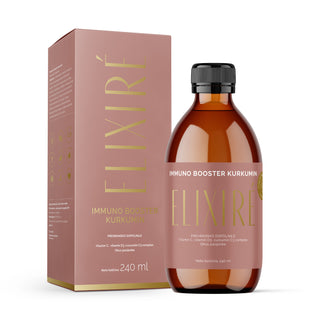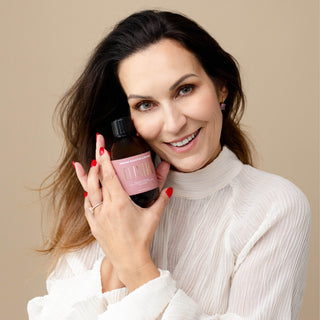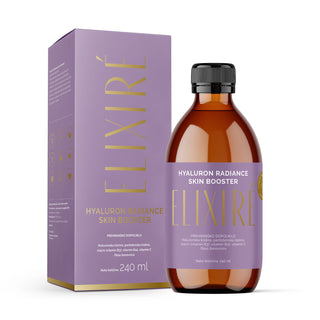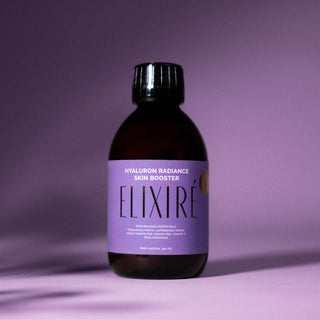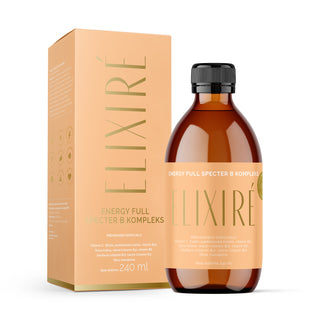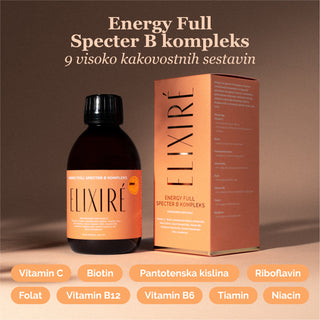How stress accelerates aging
The link between stress and premature aging is a topic that is gaining more and more attention – both in scientific research and in the wellness community. As stress has become a constant part of our daily lives, its long-term effects on our skin, cells and vitality are becoming increasingly apparent. But once we understand this connection, we can employ effective strategies to protect our bodies and slow the signs of aging.
Stress triggers a hormonal cascade that increases levels of cortisol and adrenaline. While these are essential for short-term responses, chronically elevated levels cause inflammation and oxidative stress—two key triggers of accelerated aging. (1*)
Elevated cortisol contributes to the breakdown of collagen and elastin – proteins that keep skin firm and elastic. When these structures weaken, wrinkles, loss of elasticity and a tired appearance appear.
Get help here Elixiré Collagen with Naticol® and Q10, which supports collagen integrity, skin's natural glow and cellular renewal with powerful antioxidants.
View the product → COLLAGEN with coenzyme Q10, white and yellow peach flavor
The science behind stress and aging
Telomere shortening and cellular aging
One of the clearest biological markers of aging is telomeres – the protective caps at the ends of chromosomes. Research shows that chronic stress accelerates their shortening, accelerating the aging process at the cellular level. (2*)
Elixiré B-complex Energy Full Spectrum With its liposomal form of B vitamins, it supports DNA repair, energy production and cell endurance during periods of stress.
Oxidative stress, free radicals and cellular energy depletion
Stress promotes the formation of free radicals, which damage skin cells, weaken the skin barrier, and use up cellular energy. The result is fatigue, brain fog, and a weakened immune response. (3*)
Elixiré Liposomal Vitamin C Booster It acts as a powerful antioxidant that protects cells from oxidative stress, supports the immune system and restores energy.
Visible signs of stress-related aging
Stress manifests itself externally as uneven skin tone, loss of radiance, acne, fine lines, dark circles under the eyes, and thinning hair. Sleep disturbances caused by stress further impair skin regeneration.
It helps here. Elixiré Bye Bye Stress (coming soon), which will support cortisol regulation, relaxation, and better quality sleep.
How to reduce the effects of stress and aging
1. Practicing mindfulness
Meditation, breathing techniques, and yoga have been shown to lower cortisol levels and restore internal balance. (4*)
In combination with adaptogenic formulas, such as Bye Bye Stress (coming soon) , create strong support for stress resistance.
2.Nutrition for skin and cells
Foods rich in antioxidants (vitamin C, E, omega-3, adaptogens) reduce oxidative stress. For additional protection, include them in your daily diet. Elixiré Collagen and Hyaluronic Radiance Skin Booster, which support moisture, radiance and long-term skin health.
View the product
→ COLLAGEN + HYLURON
3. Exercise for hormonal balance
Regular exercise lowers stress hormones, increases endorphins, and supports mood, focus, and metabolism. After exercise, it helps Elixiré Hair Fusion or Bye Bye Fat, which contribute to regeneration, metabolic balance and long-term vitality.
Comprehensive anti-aging support with Elixiré
For a balanced approach to managing stress and aging, Elixiré offers complete support:
- Collagen with Naticol® and Q10 – collagen protection, skin radiance and antioxidant power.
- Liposomal Vitamin C Booster – for immune support, antioxidant protection and cellular energy.
- Liposomal B-Complex Energy Full Spectrum – for cellular energy, regeneration and resistance to stress.
- Hyaluronic Radiance Skin Booster – for moisture, elasticity and radiant skin.
- Bye Bye Stress (coming soon) – to support relaxation, cortisol balance, and better sleep.
By combining exercise, nutrition, mindfulness, and Elixiré formulas, you can mitigate the effects of stress, support vitality, and maintain your natural youthful energy – from the inside out.
Literature: (*)
1. Source:
Accelerated telomere shortening in response to life stress, (ES Epel, EH Blackburn, J. Lin, R.M. Cawthon),
https://www.pnas.org/doi/10.1073/pnas.0407162101 2. Source:
The Link between Chronic Stress and Accelerated Aging, (YE Yegorov, AV Poznyak, NG Nikiforov, IA Sobenin, AN Orekhov),
https://pmc.ncbi.nlm.nih.gov/articles/PMC7400286/ 3. Source:
The impact of oxidative DNA damage and stress on telomere homeostasis, (RP Barnes, E. Fouquerel, PL Opresko),
https://pmc.ncbi.nlm.nih.gov/articles/PMC6162185/ 4. Source:
Meditation, stress processes, and telomere biology, (QA Conklin, AD Crosswell, CD Saron, ES Epel),
https://www.sciencedirect.com/science/article/abs/pii/S2352250X18302008



